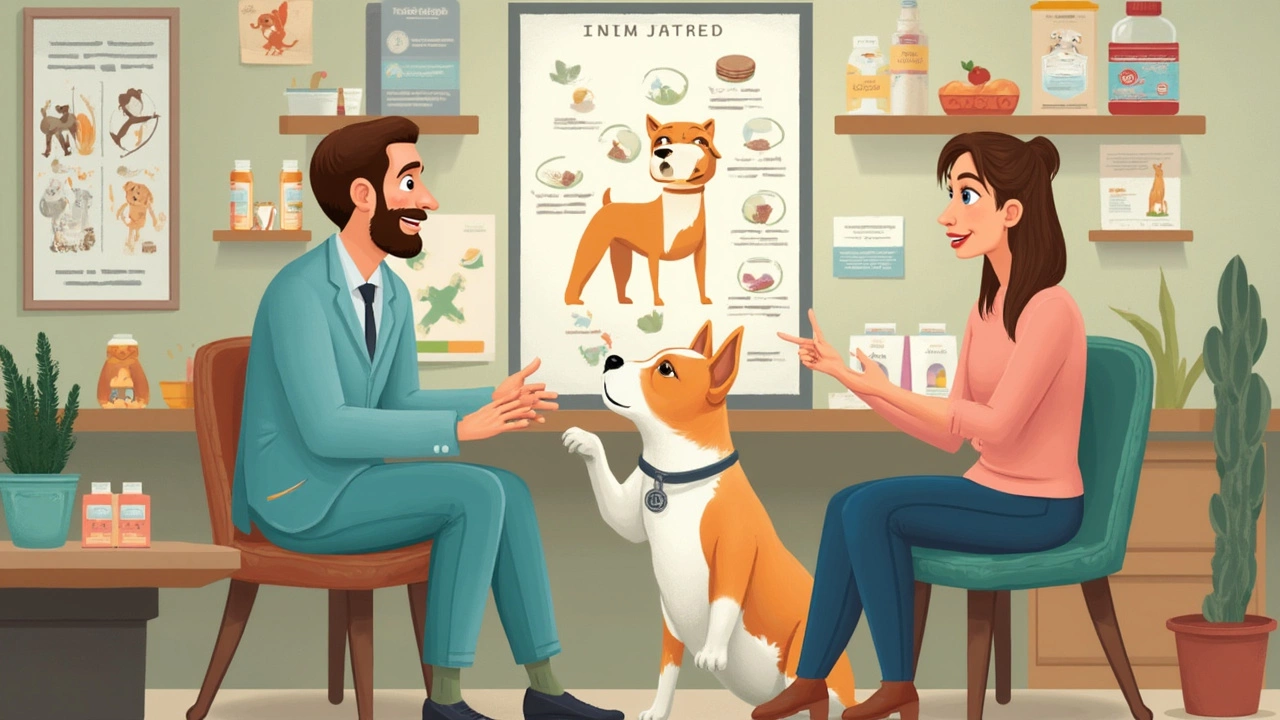Ever wondered if it's safe to share your protein powder with your furry friend? It sounds like a simple way to pump up their protein intake, right? But hold on a second. Dogs aren't just little humans in fur coats, and their dietary needs aren't the same as ours.
First things first: dogs need protein, but the kind and amount matter a lot. Their protein sources should typically come from animal-based ingredients like chicken, beef, or fish. Human protein powders are usually made for, well, humans. They often contain artificial sweeteners or fillers that could be a problem for dogs.
So, what's the big deal with human protein powder? It might have ingredients that aren't safe for dogs. Plus, dogs process proteins and other nutrients differently, so what works for your gym routine could mess with your dog's digestion or overall health. Interested in how to keep your pup's diet balanced and safe? Let’s dig deeper into this whole protein powder puzzle.
- Understanding Dogs' Dietary Needs
- What's In Human Protein Powder?
- Risks of Giving Dogs Human Protein
- Alternative Protein Sources for Dogs
- Tips for a Balanced Canine Diet
Understanding Dogs' Dietary Needs
Dogs are not just another member of the human family; their dietary needs are quite different from ours. While we might thrive on a wide variety of foods, canine diets must be more specifically tailored to their unique digestive systems and nutritional requirements.
For starters, protein is an essential component of a dog's diet. Unlike humans who might get protein from a variety of plant and animal sources, dogs primarily rely on animal-based proteins like chicken, beef, and fish. These sources provide essential amino acids that are critical for their growth, muscle strength, and immune health.
Aside from protein, dogs need a balanced intake of fats and carbohydrates. Fats are vital for energy and maintaining healthy skin and coats, while carbs provide a quick energy boost. What's crucial here is the balance, as too much of one or the other can lead to health issues like obesity or deficiencies.
Dog protein needs also vary by age, size, and activity level. Puppies, for example, need more protein and calories for growth, while a senior dog might require a diet that’s lower in calories but rich in specific nutrients to support joint health and prevent muscle loss. Here's a quick look at the general protein requirements based on age and activity level:
| Dog Type | Protein Requirement (as % of daily diet) |
|---|---|
| Puppies | 22-25% |
| Active Adult Dogs | 18-25% |
| Senior Dogs | 15-18% |
Besides the basic nutritional needs, dogs should have a diet that includes vitamins, minerals, and water in the right amounts. All these elements work together to ensure their well-being.
So, when considering supplements like human protein powder for dogs, it's important to remember that a dog's diet isn't just about adding more protein. It’s about the right kind of protein and other elements to fit their needs.
What's In Human Protein Powder?
Ever flip over a protein powder container to check out what's inside? You might expect just pure protein, but there's usually more. Most human protein powders come packed with a bunch of things beyond protein itself, and that can make a difference for your pup.
Typically, these powders are made from whey, soy, or pea protein. But they're also loaded with stuff like artificial sweeteners, flavorings, and sometimes even added vitamins and minerals aimed at boosting a human's workout recovery. Here's where it gets tricky for dogs. Ingredients like xylitol, a common sweetener, are actually toxic to dogs and can cause severe health issues.
A dietitian, Maria Jones, once said,
"While human protein powders enhance an athlete's protein intake efficiently, the additional ingredients can be more harm than help to other species, particularly dogs."This extra stuff might not sit well with your pet’s digestive system at all.
Besides, the types of protein – say from soy or dairy – might not be the best fit for dogs, especially those with allergies. A dog naturally thrives on animal proteins that are easier to digest and better matched to their dietary needs.
Wondering how much protein a dog needs compared to a human? Check this simple table:
| Species | Daily Protein Requirement |
|---|---|
| Human (Average Adult) | 46-56 grams |
| Dog (Medium Size) | 22-25 grams |
See how different those numbers are? It highlights why a one-size-fits-all protein approach doesn’t really work.

Risks of Giving Dogs Human Protein
So you're thinking of sharing your human protein powder with your dog? Before you sprinkle a scoop into their food, let’s talk about some potential risks you might not have considered.
First off, many protein powders made for humans contain artificial sweeteners like xylitol. Seems harmless, right? Not for dogs! Xylitol is seriously toxic to them and can lead to rapid insulin release, causing drops in blood sugar that can be life-threatening.
Then there's the issue of ingredients like fillers or added vitamins and minerals. Dogs have a diet tailored for their specific needs, and over-consuming certain nutrients can put extra stress on their organs. Plus, too much protein might actually strain their kidneys over time.
To give you a clearer view, here's a quick breakdown of some typical human protein powder risks:
- Digestive Distress: Additives and lactose can upset your dog’s stomach, leading to vomiting or diarrhea.
- Allergy Alerts: Some dogs with food sensitivities could have allergic reactions to ingredients in these powders.
- Calorie Surplus: Extra calories might lead to weight gain, which opens up another can of worms—like joint problems and diabetes.
Managing your dog’s diet with their specific needs in mind is key. It's tempting to think, "Hey, it boosts my energy, why not give it to my dog?" But their bodies handle things quite differently. When it comes to protein for pups, sticking to dog-approved sources is your best bet.
Alternative Protein Sources for Dogs
Alright, if human protein powder isn't the way to go for your dog, what are some safe and healthy alternatives? Good news: there are several natural and dog-friendly options you can try that won't mess with their tummies.
First up, meat is always a safe bet. Dogs are natural carnivores, and they thrive on animal proteins. Options like chicken, turkey, and beef are not only affordable but also packed with protein and nutrients. Make sure to cook the meat properly to avoid any potential bacteria.
Not into cooking fresh meat all the time? Canned or dry dog foods are designed to deliver the right balance of protein and other nutrients. Just check the labels to ensure they're meeting your dog's needs. Look for foods that list a high-quality protein source as the first ingredient.
Eggs are another great protein source for dogs. They're simple to prepare—just make sure they're cooked to avoid any salmonella risk. Eggs are rich in amino acids and essential nutrients that support your dog's health.
Some dogs thrive on fish, too. Salmon is a popular choice. It's loaded with omega-3 fatty acids, which are great for your dog's coat and joint health. Again, be sure to cook it thoroughly to avoid any issues.
You can also explore plant-based proteins if your dog has specific dietary needs. Things like lentils or chickpeas are sometimes included in dog foods as supplementary proteins. Just keep an eye on their overall diet to ensure they're getting enough essential amino acids.
Finally, let's not forget about protein supplements specifically designed for dogs. These products are made with their needs in mind and don’t contain the fillers or additives found in human supplements. Consult your vet if you think a supplement might be needed to round out your dog's diet.
By choosing the right dog protein sources, you'll be doing your furry friend a huge favor in keeping them healthy and happy.

Tips for a Balanced Canine Diet
Keeping your pup’s diet balanced is one of the best things you can do for their health and happiness. You might wonder where to start, though. Don’t worry, it’s simpler than you think!
First up, always ensure your doggo's diet includes high-quality protein. This means meat sources like chicken, beef, or fish are ideal. These provide not just protein but essential amino acids too.
Certain fruits and veggies can make fantastic additions. Think carrots, apples (minus the seeds), and peas. Dogs benefit from their vitamins and fibers, just like we do.
Portion control is crucial. Overfeeding not only leads to obesity but also strains their joints and organs. A handy rule? Use their rib cage as a guide—if you can feel their ribs without pressing hard, you're on track.
Dog protein needs vary, so consulting with a vet for personalized advice is always wise. According to Dr. Julie Buzby, a leading veterinarian,
“A balanced diet will provide your dog with the necessary energy and nutrients to maintain a healthy lifestyle.”
Don’t skip on fats. They’re vital for glowing coats and skin, and healthy fats like omega-3s come from fish oil or flaxseed oil.
- Dog Health Supplements: They can fill nutritional gaps. Look for ones containing probiotics or glucosamine, recommended by your vet.
- Water, always access to fresh, clean water. Hydration does wonders for their system.
- Regular mealtimes help maintain consistent digestion and metabolism.
Avoid the temptation of using human foods like spicy remnants or sugary treats as rewards. It messes up their dietary balance more than you’d think.
If ever in doubt, get an expert’s opinion. Vets can guide and tailor a diet plan to your dog's specific needs. So, feed them right, play lots, and you’ll have a healthy, happy pup.
